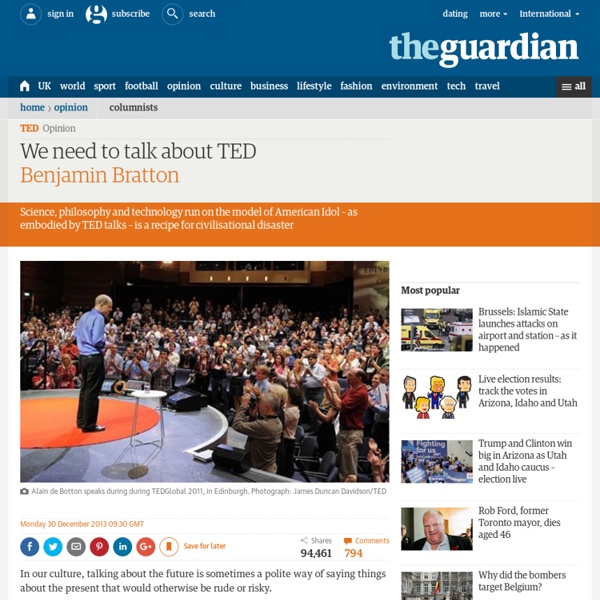We need to talk about TED

The End of Solitude
By William Deresiewicz What does the contemporary self want? The camera has created a culture of celebrity; the computer is creating a culture of connectivity. As the two technologies converge — broadband tipping the Web from text to image, social-networking sites spreading the mesh of interconnection ever wider — the two cultures betray a common impulse. Celebrity and connectivity are both ways of becoming known. So we live exclusively in relation to others, and what disappears from our lives is solitude. I once asked my students about the place that solitude has in their lives. To that remarkable question, history offers a number of answers. Like other religious values, solitude was democratized by the Reformation and secularized by Romanticism. But it is with Romanticism that solitude achieved its greatest cultural salience, becoming both literal and literary. Modernism decoupled this dialectic. Under those circumstances, the Internet arrived as an incalculable blessing.
Dont Follow Your Passion, Follow Your Effort
I hear it all the time from people. “I’m passionate about it.” “I’m not going to quit, It’s my passion”. Or I hear it as advice to students and others “Follow your passion”. What a bunch of BS. “Follow Your Passion” is easily the worst advice you could ever give or get. Why ? Think about all the things you have been passionate about in your life. If you really want to know where you destiny lies, look at where you apply your time. Time is the most valuable asset you don’t own. Let me make this as clear as possible 1. 2. 3. 4. Don’t follow your passions, follow your effort.
The secret of self-control
In the late nineteen-sixties, Carolyn Weisz, a four-year-old with long brown hair, was invited into a “game room” at the Bing Nursery School, on the campus of Stanford University. The room was little more than a large closet, containing a desk and a chair. Carolyn was asked to sit down in the chair and pick a treat from a tray of marshmallows, cookies, and pretzel sticks. Carolyn chose the marshmallow. Although she’s now forty-four, Carolyn still has a weakness for those air-puffed balls of corn syrup and gelatine. Although Carolyn has no direct memory of the experiment, and the scientists would not release any information about the subjects, she strongly suspects that she was able to delay gratification. Footage of these experiments, which were conducted over several years, is poignant, as the kids struggle to delay gratification for just a little bit longer. Most of the children were like Craig. Carolyn Weisz is a textbook example of a high delayer. But Mischel has found a shortcut.
Related:
Related:



